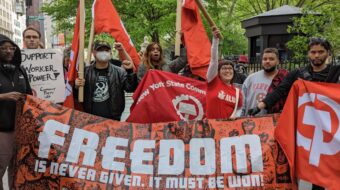“You are winning the Super Bowl of workers’ rights,” Jesse Jackson told 60,000 workers, families and friends in Madison, Wis., last week.
It will strike some as extremely odd that Wisconsin’s Republican Governor Scott Walker gave rise to a political strike – not a collective bargaining strike – by deciding to attack public workers’ right to collectively bargain.
When the tens of thousands of teachers, public workers and those that they serve – students, parents and grandparents – gathered in Madison to protest stripping Wisconsin working people of their rights, they in fact discarded all ordinary collective bargaining interests related to pay and benefits, to expose the serious threat to democracy in the governor’s right-wing agenda. In doing so, they rose heroically to meet the challenge of a political strike, proposing alternative budget and tax policies, addressing the budget deficit issues head on, taking political leadership on issues that affect not only themselves but all working people – and all citizens – of Wisconsin.
Taking away public workers’ rights to bargain has devastating effects on jobs, incomes and economic recovery in Wisconsin. But it also says, with respect to education, for example, that the people most directly affected by education – the teachers, students and parents – shall have NO seat at the decision-making table on the entire question of education. Further, firefighters shall have no effective say on fire dangers. Police will have no effective say on public safety. Not to mention many other public services and their providers – not least, sanitation workers who know what is garbage, and what is not.
The attack on public workers has nothing to do with budget fixing, as all actual budget issues are off the table. It is merely a cover to launch an attack on public services of every description while raiding the public treasury for $140 million in new tax breaks for corporations and the rich. In other words: take the money spent on education and give it to the Koch brothers who have large timber interests in Wisconsin, and who funded so-called tea party and other candidates – including Gov. Walker. These candidates are little more than shills, con jobs pretending to be grassroots advocates, intent on destroying democratic government and any other obstacle in the way of wealth accumulation for the top 1 percent of the population.
Butter would not melt in the mouths of the scoundrels who proclaim “unions are only for the private sector,” when in fact they and their rich backers have spent the past 75 years attempting to reverse the passage of the National Labor Relations Act, protecting private sector workers, ever since the day it was enacted in 1935. Aided by globalization, changes in labor law that permit firing workers who organize or strike to defend themselves, and changes in the modes of private production, these public enemies have made great progress toward rolling workers’ rights back to where they want them to go – to the mid-19th century.
Wisconsin is showing that public workers, when they are united with those they serve, can block, stop, and – if we ALL lend a hand – reverse this exceedingly dangerous assault. If this assault is not turned back, we could see a confrontation between haves and have-nots that could rival the conflict over slavery in its devastating consequences for our country.
Marxists long thought (and it was born out in much experience in the past century) that production workers in mass industries would lead the path toward genuine democracy and progress throughout the world. The advancing social nature of production was a powerful argument for more democratic controls over large-scale economic institutions (corporations), who were growing “too big to fail” and in many ways “too big to remain private” without unacceptable costs to society.
Most democratic reforms of the past century were focused on addressing various aspects of the growing social inter-dependencies in advanced capitalist economies. In fact, more socialized relations – in the form of more regulatory and income redistribution legislation (e.g. Social Security, Medicare and other public health care programs, public education, labor protections, civil rights, environmental regulation, financial regulation, and so on) – have given rise to a very large domain of public, nonprofit and quasi-public institutions upon which we all depend. Even the corporations depend on these institutions while they simultaneously, and schizophrenically, seek to corrupt them so that they do not stray into the “hands of the people,” who, they noisily proclaim, are not “entitled” to anything.
Thus public workers – in a sense, the kernel of the socialized component and infrastructures of our society – may have replaced private production workers as the leading edge of this titanic democratic struggle now under way. Perhaps it’s too soon to finally judge – but it is a fascinating and thrilling moment for the entire progressive movement to ponder. Not just ponder: put your shoulder to the wheel, brothers and sisters, because this train is bound for glory.












Comments